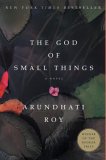Summary | Excerpt | Reading Guide | Reviews | Readalikes | Genres & Themes | Author Bio

It hadn't changed, the June Rain.
Heaven opened and the water hammered down, reviving the reluctant old well, greenmossing the pigless pigsty, carpet bombing still, tea-colored puddles the way memory bombs still, tea-colored minds. The grass looked wetgreen and pleased. Happy earthworms frolicked purple in the slush. Green nettles nodded. Trees bent.
Further away, in the wind and rain, on the banks of the river, in the sudden thunderdarkness of the day, Estha was walking. He was wearing a crushed-strawberry-pink T-shirt, drenched darker now, and he knew that Rahel had come.
Estha had always been a quiet child, so no one could pinpoint with any degree of accuracy exactly when (the year, if not the month or day) he had stopped talking. Stopped talking altogether, that is. The fact is that there wasn't an "exactly when." It had been a gradual winding down and closing shop. A barely noticeable quietening. As though he had simply run out of conversation and had nothing left to say. Yet Estha's silence was never awkward. Never intrusive. Never noisy. It wasn't an accusing, protesting silence as much as a sort of estivation, a dormancy, the psychological equivalent of what lungfish do to get themselves through the dry season, except that in Estha's case the dry season looked as though it would last forever.
Over time he had acquired the ability to blend into the background of wherever he was--into bookshelves, gardens, curtains, doorways, streets--to appear inanimate, almost invisible to the untrained eye. It usually took strangers awhile to notice him even when they were in the same room with him. It took them even longer to notice that he never spoke. Some never noticed at all.
Estha occupied very little space in the world.
After Sophie Mol's funeral, when Estha was Returned, their father sent him to a boys' school in Calcutta. He was not an exceptional student, but neither was he backward, nor particularly bad at anything. An average student, or Satisfactory work were the usual comments that his teachers wrote in his Annual Progress Reports. Does not participate in Group Activities was another recurring complaint. Though what exactly they meant by "Group Activities" they never said.
Estha finished school with mediocre results, but refused to go to college. Instead, much to the initial embarrassment of his father and stepmother, he began to do the housework. As though in his own way he was trying to earn his keep. He did the sweeping, swabbing and all the laundry. He learned to cook and shop for vegetables. Vendors in the bazaar, sitting behind pyramids of oiled, shining vegetables, grew to recognize him and would attend to him amidst the clamoring of their other customers. They gave him rusted film cans in which to put the vegetables he picked. He never bargained. They never cheated him. When the vegetables had been weighed and paid for, they would transfer them to his red plastic shopping basket (onions at the bottom, brinjal and tomatoes on the top) and always a sprig of coriander and a fistful of green chilies for free. Estha carried them home in the crowded tram. A quiet bubble floating on a sea of noise.
At mealtimes, when he wanted something, he got up and helped himself.
Once the quietness arrived, it stayed and spread in Estha. It reached out of his head and enfolded him in its swampy arms. It rocked him to the rhythm of an ancient, fetal heartbeat. It sent its stealthy, suckered tentacles inching along the insides of his skull, hoovering the knolls and dells of his memory, dislodging old sentences, whisking them off the tip of his tongue. It stripped his thoughts of the words that described them and left them pared and naked. Unspeakable. Numb. And to an observer therefore, perhaps barely there. Slowly, over the years, Estha withdrew from the world. He grew accustomed to the uneasy octopus that lived inside him and squirted its inky tranquilizer on his past. Gradually the reason for his silence was hidden away, entombed somewhere deep in the soothing folds of the fact of it.
1997 Arundhati Roy All Rights Reserved.
Your guide toexceptional books
BookBrowse seeks out and recommends the best in contemporary fiction and nonfiction—books that not only engage and entertain but also deepen our understanding of ourselves and the world around us.